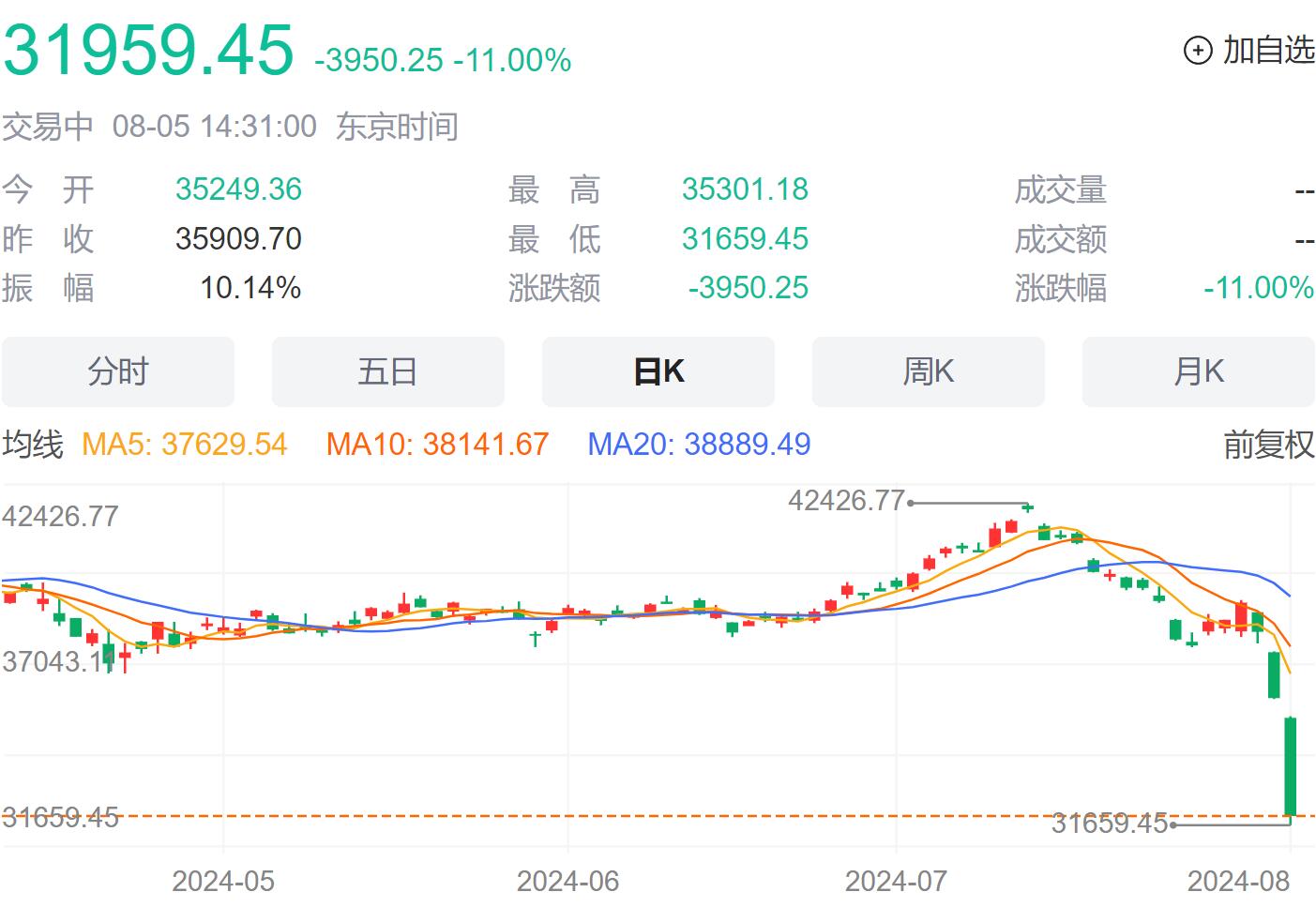Overseas stock markets experience 'Black Monday'! Japanese stock market 'leads' sharp decline
The overseas stock market sell-off intensified on Monday (August 5th) as the market became increasingly concerned about the Fed's slow progress in policy support for the slowing US economy, prompting investors to turn to bonds. The Japanese stock market plummeted nearly 10%, as traders included more expectations of domestic interest rate hikes.

The Tokyo Composite Index and Nikkei Index have fallen about 20% from their historical highs, and these two benchmark indices have been falling for three consecutive days, which will be the worst day since the Fukushima nuclear disaster in 2011 and push them into a bear market. Based on the expectation that the Bank of Japan will continue to raise interest rates, the yen rose by over 3% at one point
The main driving force behind the previous market rise was foreign investors, who sold a net of 1.56 trillion yen ($10.7 billion) worth of Japanese cash stocks and futures in the week ending July 26th. During this period, the CSI index fell by more than 5%, the largest decline in four years.
The latest round of stock market crashes, led by technology stocks and exacerbated by the downturn in the US stock market, has led to a significant adjustment in market expectations for returns in the Japanese stock market for the remainder of this year, "said Andrew Jackson, head of Japanese stock market strategy at Ortus Advisors Pte in Singapore, in a report.
Stocks in South Korea and Australia also fell, leading to the largest decline in regional stock indices in three years. Worries about the US economic outlook stimulated demand for fixed income assets. Global bonds wiped out losses this year, while the rebound of US treasury bond bonds reduced the yield of two-year treasury bond bonds to the lowest point since May 2023.
The price trend highlights how market sentiment quickly shifts from expecting the Federal Reserve to achieve a soft landing for the US economy. Signs of weakness in the US economy triggered a sharp fall on Wall Street on Friday and a sharp fall in treasury bond bond yields. Last Friday's data showed that non farm payroll employment increased by 114000 in July - one of the weakest figures since the pandemic - and employment growth in the first two months was downgraded. The unemployment rate unexpectedly climbed to 4.3% for the fourth consecutive month, triggering a highly anticipated recession indicator.
This is a rather dramatic narrative shift, indicating how much of the recent trend is based on expectations of a soft landing in the United States, "said Charu Chanana, head of monetary strategy at Saxo Bank A/S
After the rebound of US treasury bond bonds last Friday, the yield of Japanese 10-year benchmark bonds fell to the lowest level since April, and fell as much as 17 basis points on Monday to 0.785%. The magnitude of the decline in New Zealand yields is similar, while Australian bonds are closed due to bank holidays, and the Reserve Bank of Australia will hold a policy meeting the next day.
Asian currencies rose on Monday, while the decline of the Mexican peso continued as traders continued to unwind from emerging market arbitrage trading. The sudden appreciation of financing currencies has disrupted these popular bets, which typically involve borrowing at lower interest rates to invest in high-yield assets.
In terms of commodities, oil prices rose on Monday, with reports suggesting that Iran may strike Israel in retaliation for the assassination of Hezbollah and Hamas officials. Gold is oscillating in the 2414-2458 range and currently trading around $2447.71 per ounce.
Tips:This page came from Internet, which is not standing for FXCUE opinions of this website.
Statement:Contact us if the content violates the law or your rights
